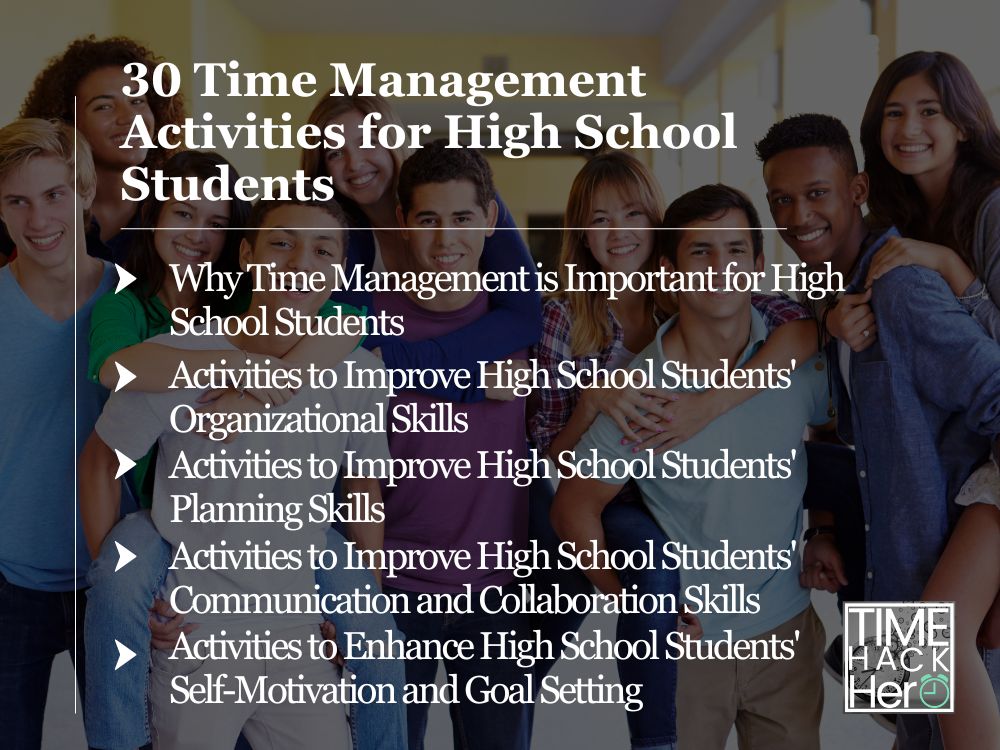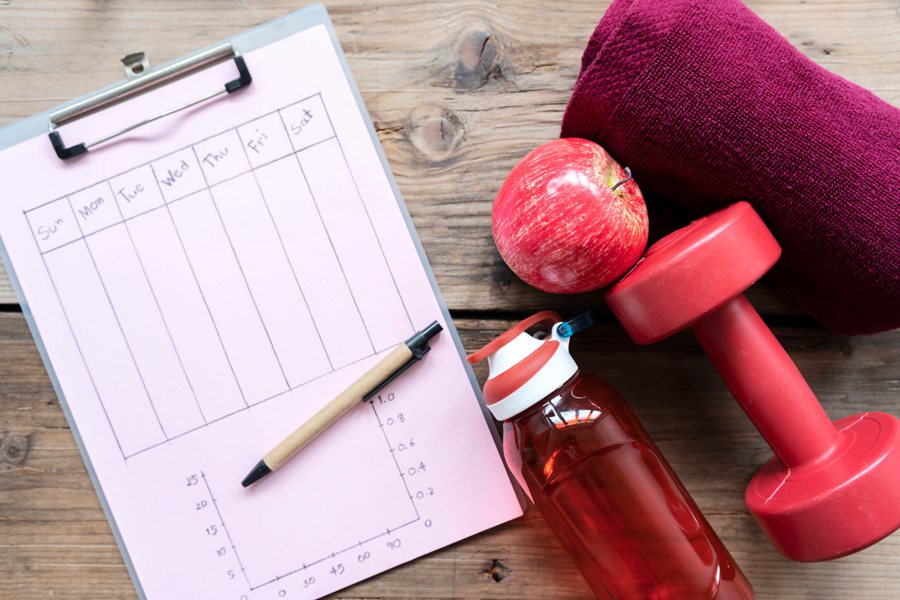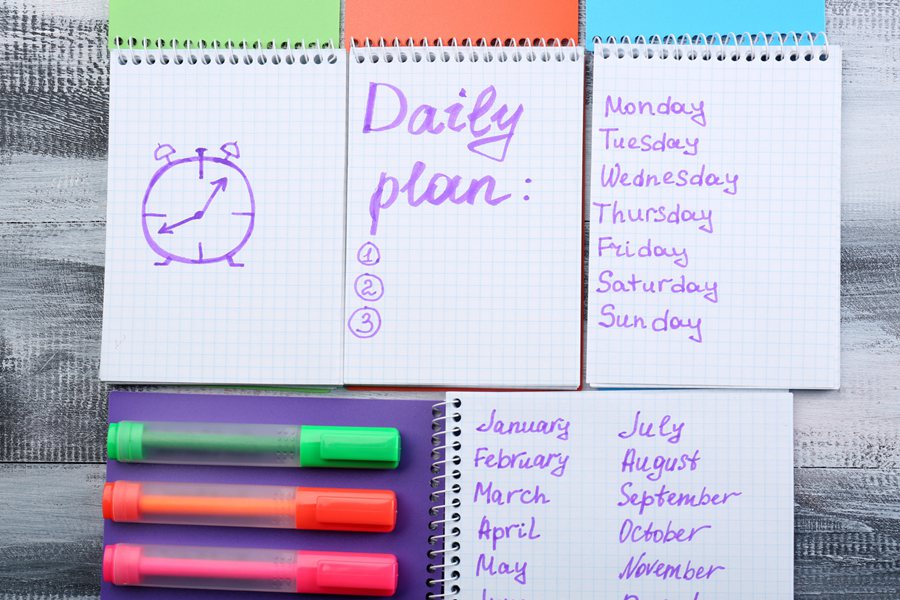Time management is an essential skill for high school students, as it calls for juggling academic demands, extracurricular activities, and social life while attempting to stay organized and reduce stress. By implementing various time management activities and techniques, you can become more efficient and boost your productivity throughout your high school years.
To help you succeed, this article will discuss 25 time management activities specifically designed for high school students. These activities encompass various approaches, from self-reflection and prioritization to mindfulness breaks and goal-setting, all meant to enhance your ability to manage time effectively and prepare you for the challenges awaiting you in college and beyond.
By incorporating these time management activities into your daily routine, you will not only learn to allocate your time wisely but also identify distractions and potential pitfalls in your schedule. Embrace the possibilities of improving your time management skills and witness how it positively impacts your life as a high school student.
Table of Contents
Why Time Management is Important for High School Students
Effective time management is a critical skill for high school students to develop. It involves the ability to prioritize tasks, set goals, and allocate time wisely. By managing their time effectively, students can optimize their academic performance, reduce stress, and create a healthy work-life balance. Let’s explore the key reasons why time management is crucial for high school students:
Academic Success
Time management allows students to allocate dedicated time for studying, completing assignments, and preparing for exams. By organizing their study schedule and breaking down tasks, students can improve their understanding of subjects and achieve better academic results.
Reduced Stress
Effective time management helps students avoid last-minute cramming and the stress that comes with it. By planning ahead and allocating sufficient time for each task, students can reduce stress levels, stay on top of their workload, and have a sense of control over their responsibilities.
Increased Productivity
When students manage their time effectively, they can maximize their productivity. By setting goals, prioritizing tasks, and eliminating distractions, students can focus their energy and effort on activities that matter the most, leading to increased efficiency and achievement.
Development of Essential Skills
Time management nurtures important skills such as discipline, organization, and self-motivation. These skills are not only valuable in high school but also essential for success in college, careers, and personal life.
Work-Life Balance
By managing their time wisely, students can strike a balance between academics, extracurricular activities, social life, and personal pursuits. This enables them to enjoy a well-rounded high school experience and maintain their physical and mental well-being.
In conclusion, time management is a vital skill for high school students. It empowers them to excel academically, reduces stress, increases productivity, develops essential life skills, and promotes a healthy work-life balance. By honing their time management abilities, students can set themselves up for success both during their high school years and beyond.
Activities to Improve High School Students’ Organizational Skills:
1. Develop Personal Plans and Schedules:
Assist students in creating personal plans and schedules that include dedicated study time, breaks, and extracurricular activities. By establishing personal plans and schedules, students can better manage their time, allocate their study and leisure time effectively, and enhance their organizational skills.
2. Use Notebooks or Planners:
Encourage students to use notebooks or planners to record important tasks and deadlines, ensuring they have a clear overview of their assignments and time commitments. Notebooks and planners help students stay focused, avoid missing crucial tasks, and remind them to complete tasks on time.
3. Create Clear Task Lists:
Teach students how to create clear and concise task lists, prioritizing tasks based on importance. Creating task lists enables students to organize their work, minimize omissions and confusion, and enhance their efficiency.
4. Break Down Large Projects:
Teach students how to break down large projects into smaller parts, establishing detailed steps and timelines. Breaking down projects into manageable chunks allows students to approach tasks with greater clarity and ease, reducing task-related stress and helping them maintain a sense of overall progress.
5. Maintain a Tidy Study Environment:
Instruct students on how to organize and tidy their study environment, keeping their desks clean and clutter-free. A neat and organized study environment enhances focus, reduces distractions, and fosters students’ organizational and time management skills.
Activities to Improve High School Students’ Planning Skills:
6. Set Short-term and Long-term Goals:
Assist students in setting clear short-term and long-term goals and develop detailed plans to achieve them. By defining goals and creating plans, students can better strategize their actions, allocate time and resources effectively, and cultivate motivation to accomplish their objectives.
7. Implement Time Blocking:
Teach students to utilize time blocking to manage their schedules. Time blocking involves allocating dedicated time blocks for specific tasks or activities. Students can allocate time blocks for studying, breaks, leisure activities, and other commitments, thereby enhancing productivity and focus.
8. Set Realistic Deadlines:
Guide students in setting realistic deadlines and due dates, ensuring tasks are scheduled within appropriate timeframes. Students can learn to assess task difficulty and time requirements, enabling them to set reasonable deadlines, avoid procrastination, and improve their work efficiency.
9. Use Calendars or Reminder Apps:
Encourage students to utilize calendars or reminder apps to track important events and tasks. Students can mark important deadlines, exam dates, and activity schedules on calendars and set reminders using apps to ensure they don’t miss any crucial events or assignments.
10. Regularly Review and Adjust Plans:
Encourage students to regularly review and adjust their plans to accommodate changing needs and priorities. Students can assess their progress, evaluate their time management effectiveness, and make necessary adjustments and improvements to ensure efficient use of their time and achievement of their goals.
Activities to Improve High School Students’ Communication and Collaboration Skills:
11. Participate in Speech or Debate Competitions:
Encourage students to participate in speech or debate competitions to enhance their oral communication skills and persuasion abilities. These activities help students practice articulating their thoughts clearly, organizing their arguments, and responding to challenges, thereby boosting their confidence and communication skills.
12. Engage in Drama or Acting Classes:
Urge students to engage in drama or acting classes to improve their body language and presentation skills. Through portraying different characters and scenarios, students learn effective ways to convey messages, express emotions, and enhance their confidence and communication abilities.
13. Read and Analyze Various Literature:
Encourage students to read and analyze different types of literature to expand their vocabulary and comprehension skills. Literature exposes students to various writing styles, enhancing their sensitivity to language and expression, and improving their reading and communication proficiencies.
14. Collaborate on Group Projects:
Assign group projects that require students to work together, fostering their teamwork and collaboration skills. By working collaboratively, students learn how to coordinate efforts, communicate effectively, delegate tasks, and accomplish goals collectively, preparing them for future work environments.
15. Practice Effective Listening:
Guide students to develop active listening skills, emphasizing the importance of paying attention, asking clarifying questions, and demonstrating empathy. Effective listening enhances understanding, promotes effective communication, and cultivates stronger interpersonal relationships.
Activities to Enhance High School Students’ Self-Motivation and Goal Setting:
16. Encourage Self-Reflection:
Promote self-reflection activities where students can assess their strengths, weaknesses, and areas for improvement. Self-reflection helps students gain self-awareness, set meaningful goals, and develop strategies to achieve them, fostering self-motivation and personal growth.
17. Provide Opportunities for Choice:
Offer students choices within assignments or projects to promote autonomy and personal investment. By allowing students to select topics, approaches, or presentation methods, they feel a sense of ownership, increasing their motivation and engagement in the task.
18. Celebrate Milestones and Achievements:
Recognize and celebrate students’ milestones and achievements to reinforce their self-motivation and goal-setting behaviors. Acknowledging their progress, effort, and accomplishments boosts their confidence, encourages continued growth, and sustains their motivation for future endeavors.
19. Foster a Growth Mindset:
Promote the idea of a growth mindset among students, emphasizing that abilities and intelligence can be developed through dedication and effort. By cultivating a belief in their potential for growth and improvement, students become more resilient, motivated, and committed to setting and achieving challenging goals.
20. Provide Meaningful Feedback:
Offer constructive and specific feedback to students, highlighting their strengths and areas for improvement. Effective feedback helps students understand their progress, identify areas where they can enhance their skills, and stay motivated in their pursuit of goals.
Activities to Improve High School Students’ Prioritization and Decision-Making Skills:
21. Teach Prioritization Techniques:
Introduce students to different prioritization techniques, such as the Eisenhower Matrix or ABC method, to help them effectively prioritize tasks based on importance and urgency. These techniques assist students in making informed decisions about how to allocate their time and resources.
22. Analyze Consequences:
Encourage students to analyze the potential consequences of their actions and decisions. By considering the short-term and long-term outcomes, students develop critical thinking skills and make informed choices that align with their goals and priorities.
23. Explore Time Management Apps and Tools:
Introduce students to various time management apps and tools available, such as digital planners, task management apps, or Pomodoro timers. These tools can assist students in organizing their tasks, setting reminders, tracking progress, and improving their overall time management skills.
24. Conduct Mock Interviews:
Organize mock interview sessions where students can practice their communication and decision-making skills in a professional setting. By simulating real-life interview scenarios, students learn how to think on their feet, respond effectively to questions, and make confident decisions under pressure.
25. Engage in Role-Playing Activities:
Arrange role-playing activities that require students to take on different roles and make decisions based on specific scenarios. Role-playing exercises develop critical thinking, problem-solving, and decision-making abilities, as students learn to analyze situations, consider alternatives, and make informed choices.
26. Prioritize Extracurricular Involvement:
Encourage students to participate in extracurricular activities that align with their interests and goals. Engaging in extracurricular pursuits helps students develop time management skills by balancing their academic responsibilities with other commitments, enabling them to prioritize and make decisions about how to allocate their time effectively.
27. Practice Mindfulness and Stress Management:
Teach students mindfulness and stress management techniques to help them stay focused, make clear decisions, and maintain a balanced approach to their tasks. Mindfulness exercises, such as deep breathing or meditation, can improve students’ self-awareness, reduce stress levels, and enhance their decision-making abilities.
28. Engage in Real-World Problem Solving:
Provide opportunities for students to tackle real-world problems or challenges that require critical thinking and decision-making skills. By solving authentic problems, students develop their ability to assess situations, evaluate options, and make effective decisions based on available information and resources.
29. Foster Time Awareness:
Encourage students to develop a sense of time awareness by using timers or setting deadlines for tasks. This practice helps students understand the value of time, become more conscious of their progress, and make timely decisions to accomplish their goals.
30. Reflect on Decision Outcomes:
Encourage students to reflect on the outcomes of their decisions, both positive and negative, to gain insights into their decision-making processes. Reflective exercises help students learn from their experiences, understand the impact of their choices, and refine their decision-making skills for future endeavors.
Conclusion
In conclusion, time management is a critical skill for high school students to develop. By effectively managing their time, students can experience numerous benefits. Firstly, it allows them to increase their productivity. With proper time management techniques, students can allocate dedicated time for studying, completing assignments, and engaging in extracurricular activities. This structured approach helps them make the most of their available time and accomplish tasks efficiently.













